Home
**Beware of fakes: Anything such as websites, social media or emails not listed on this ‘Home’ page (page that you are viewing right now) and ‘Contact’ page are fake i.e. is/was never affiliated to fairwissenschaft and me. Thank you.
- fairwissenschaft alternate sites
- www.fairwissenschaft.co.uk
- www.fairwissenschaft.eu
- www.fairwissenschaft.com
- www.fairwissenschaft.net
- www.fairwissenschaft.org
- **Beware of fakes
- fairwissenschaft does not have social media accounts
- **Beware of fakes
fairwissenschaft 💻 ♌ Power of learning is realized when its effectively applied

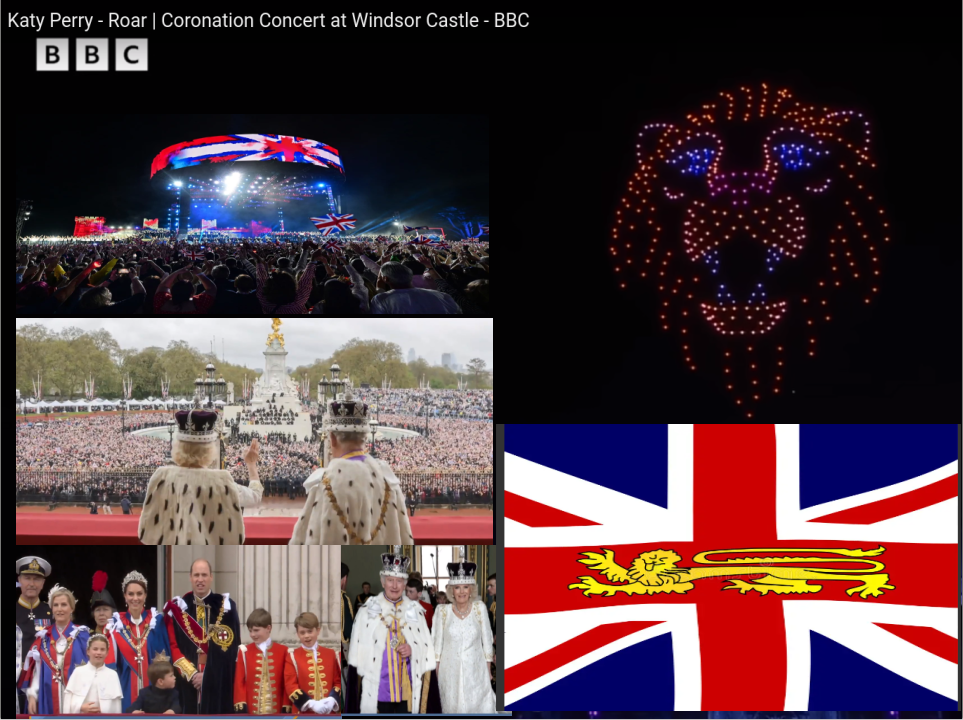
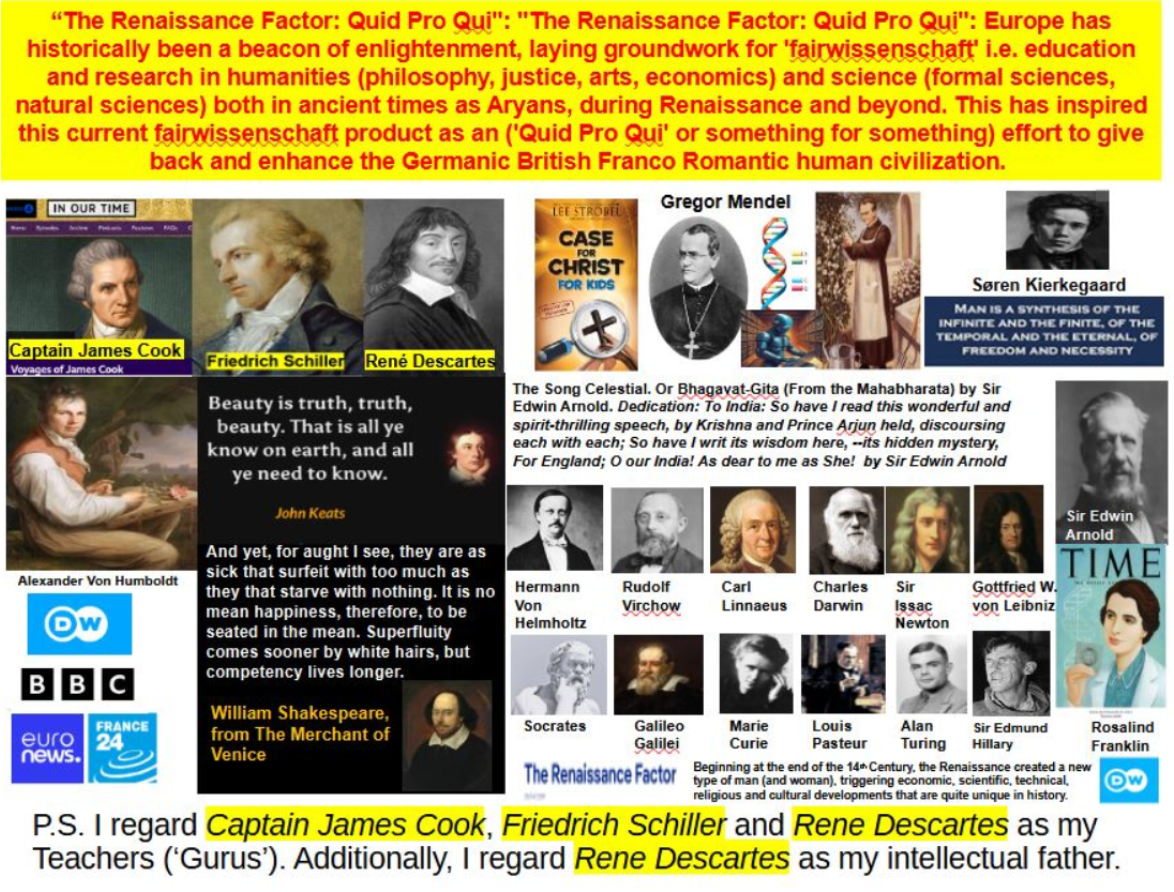
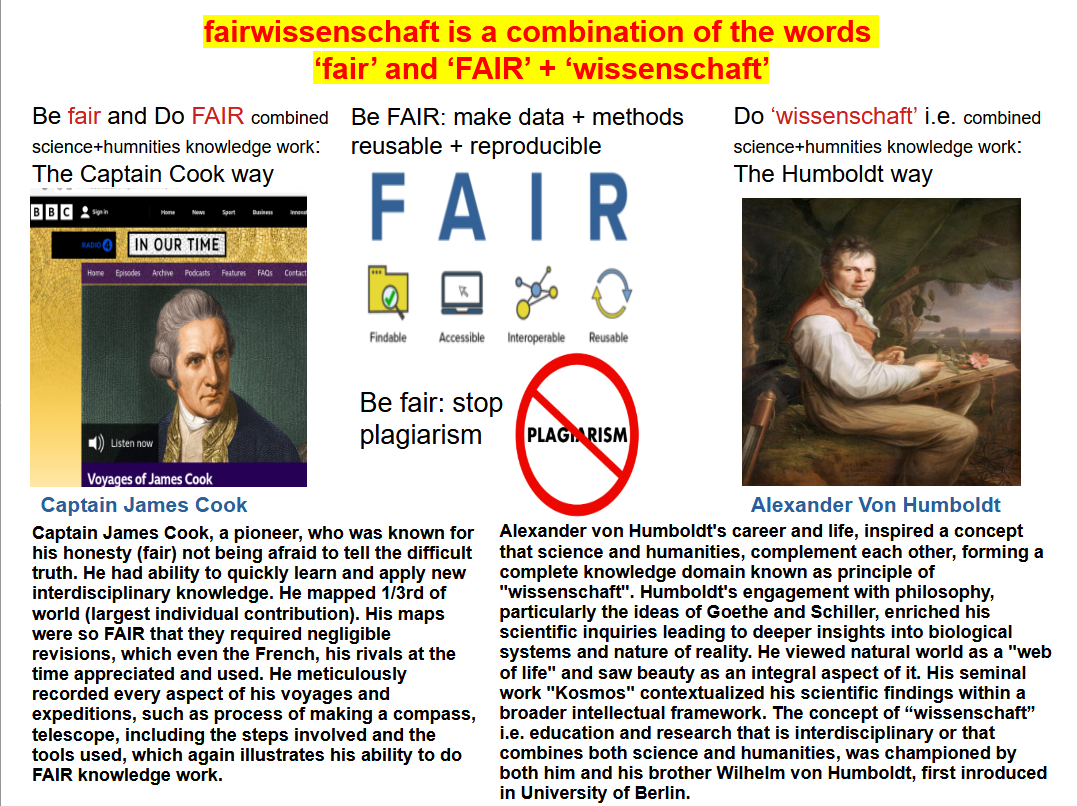
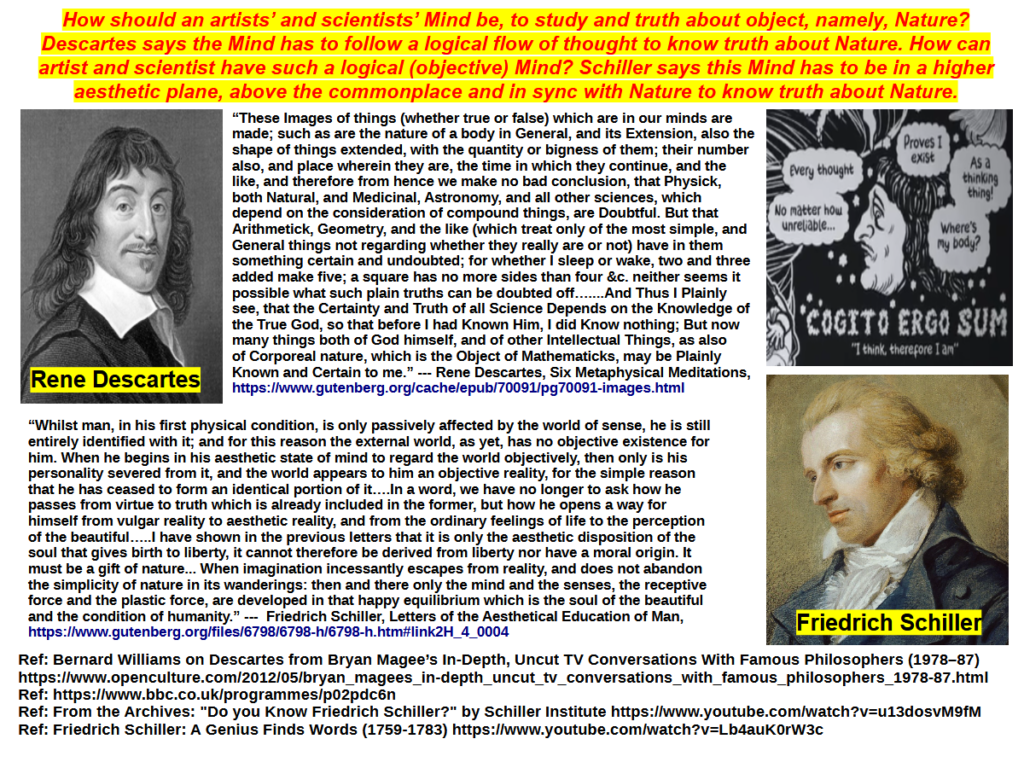
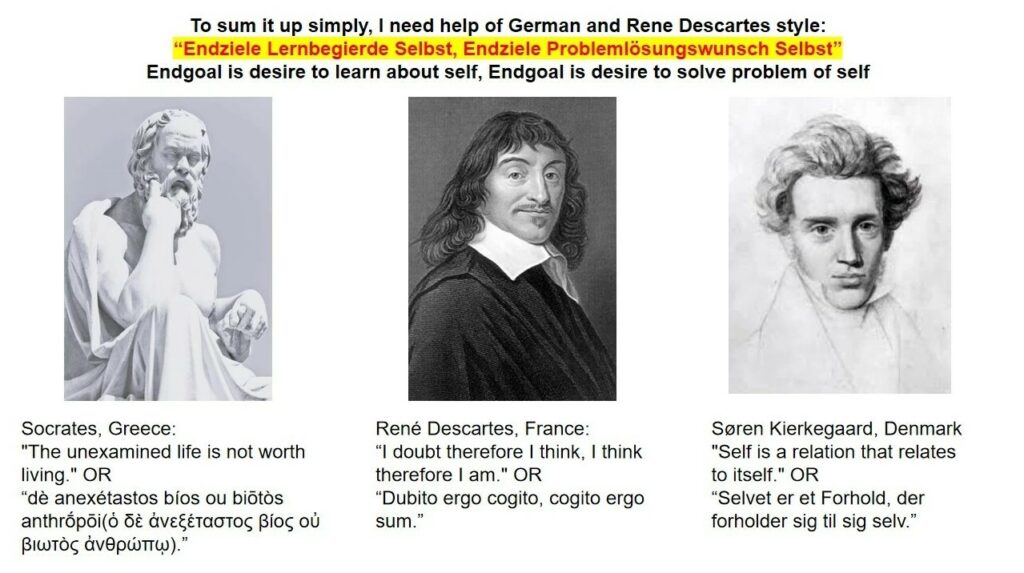
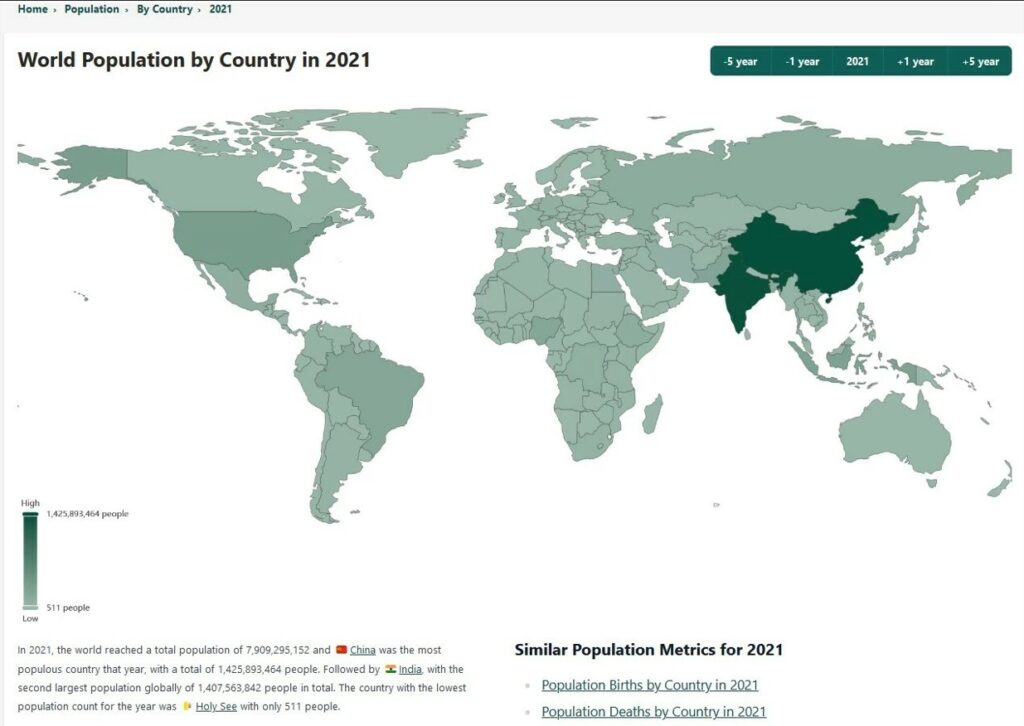
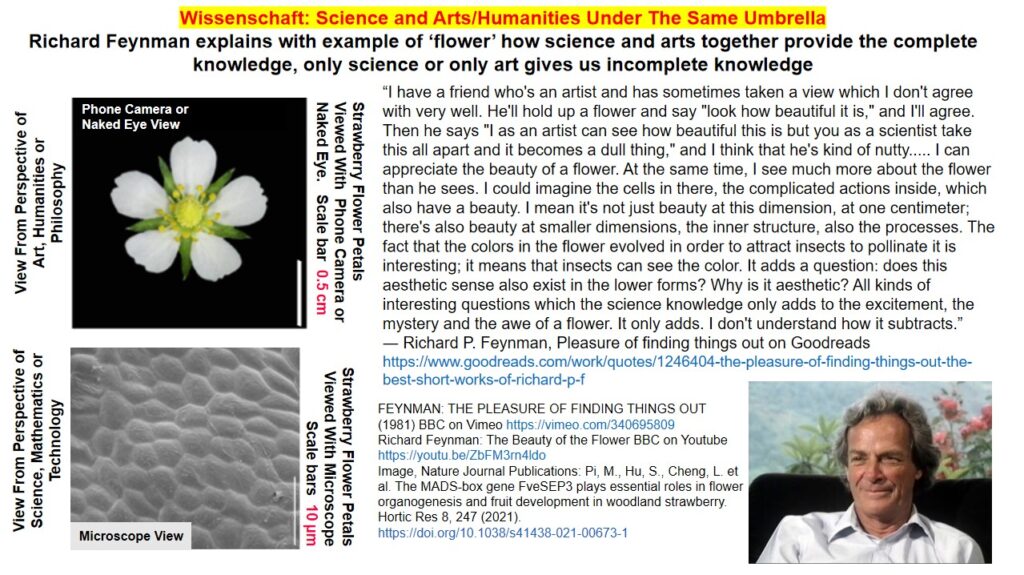
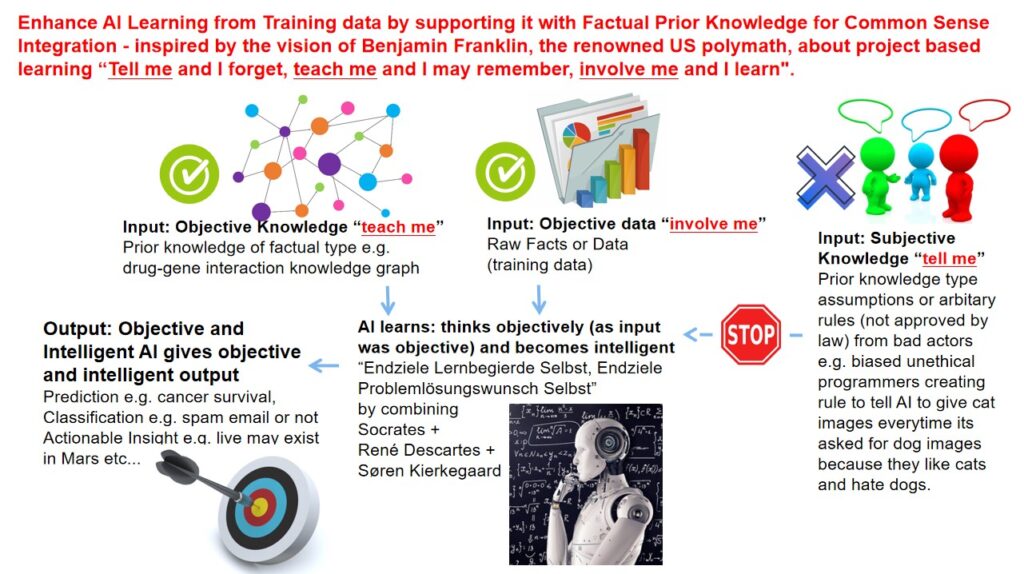
FAIRwissenschaft or fairwissenschaft
The choice of logo or symbol 💻 ♌ and its tagline Power of learning is realized when its effectively applied
In today’s fast-paced world and information age, knowledge has become an essential commodity that can make all the difference in achieving personal and professional goals. However, the true power of knowledge lies in its practical application. This is the driving force behind the creation of “fairwissenschaft”. The goal is to empower individuals by providing them with the knowledge and tools they need to transform their ideas into tangible results. Learning is the foundation for acquiring knowledge and applying it to achieve desired outcomes. The symbol for this product is a lion with a computer, #fairwissenschaft 💻 ♌ . In fairwissenschaft the word FAIR and fair are used as an acronym and as meaning just/justice, respectively. FAIR is acronym for Findable, Accessible, Interoperable and Reusable. Let me explain.
As a learning tool, computers provide instant access to a wealth of knowledge, ranging from academic resources and textbooks to multimedia content and online courses. This virtually boundless source of information allows learners to explore new subjects. Computers enable learners to interact with and engage with content in innovative ways, enhancing the learning experience and facilitating deeper understanding. Example with LLM users can chat with electronic version of books in products such as Adobe Pdf, Wondershare Pdf Elements, GPT4All (also Jan cause its models can be used in GPT4All too, and for general chat Jan is better) and PrivateGPT products — for chatting Jan is my preferred software and if I need to chat with documents I use the same Jan models in GPT4All. Example with Apple Freeform, Adobe Creative studio, Inkscape, WPS Office, Google Sheets, Libre Office, Open Office, users can create mind-maps or explainers to enhance their learning. Computers also represent the application of knowledge in practical settings. By allowing users to create, store, and process digital information, computers enable the development of new products. From programming and software development to data analysis and artificial intelligence, computers facilitate the translation of knowledge into tangible outcomes, driving innovation and progress. Thus computers represent, both the learning and application of knowledge effectively. The laptop emoji,💻 depicts an open laptop computer with a keyboard, trackpad, and screen, under the name “Personal Computer”. When selecting a symbol for the product, I also wanted something signifies the strength and power that come with its knowledge, rather applied knowledge. The lion, with its regal and fearsome image, embodies these qualities. Lions are often associated with courage, leadership, and dominance, making them a fitting choice to symbolize the brand. The ♌ Leo emoticon is a symbol of the Leo constellation, which is one of the 12 zodiac constellations. The constellation Leo is represented by the lion and is associated with the Sun’s position during Leo’s astrological period, which is generally considered to be from approximately July 23 to August 22. The lion is often associated with the United Kingdom, as it is the national animal of England and features prominently in the national flag and coat of arms. The lion has been a symbol of England since at least the 12th century, when Richard the Lionheart ruled as King. The lion is sometime presented on the national flag of the United Kingdom, known as the Union Jack, which combines the crosses of Saint George (England), Saint Patrick (Ireland), and Saint Andrew (Scotland). Taken together, the symbol of the product is leo or lion with a computer, #fairwissenschaft 💻 ♌ .
Defining FAIR Wissenschaft and fair Wissenschaft
Philosophers Socrates, Rene Descartes and Søren Kierkegaard provide the art/humanities/philosophical contributions that define this project. These three philosophers’ works, in my humble opinion, recommend a life in pursuit of knowledge (science and humanities/art). Let me explain. Socrates’ philosophy says “an unexamined life is not worth living” (Kierkegaard considered Socrates his mentor). Socrates says aim of life is examination of life (this could mean internal/self or non-self/external/surrounding universe, examination). Rene Descartes’ philosophy says “I doubt therefore I think, I think therefore I exist”. So Rene says self exists, can’ say anything about anything external but atleast self exists. Søren Kierkegaard, the inventor of existentialism gave the results of such an examined life as, “The self is a relation which relates itself to its own self” from The Sickness Unto Death. Socrates says examine life self or non-self, Rene says sure about self don’t know about non-self, so Søren says ok then examine self only and only the external/non-self that interacts with self we can be sure about (because as per Rene we’re sure about self and not non-self). When we examine universe (internal & external), we find we’re sure about only our own internal/self and not external/self, but through how we perceive/relate (examine) to the external/non-self we know it exists. So through scientific examination and artistic expression we can know that the universe exists, here knowing universe is understanding how universe works by uncovering universal mechanisms/theory (science) e.g. Newton’s laws of motion and here knowing universe is demonstrating our understanding of universe through application of universal mechanisms/theory through building technology (e.g. a simple wheel demonstrates Newton’s laws of motion) and art (e.g. paintings of nature demonstrates the structure and existence of nature). So when we examine the universe through science and humanities/art, we’re living an examined life examining both the self and its non-self surroundings that effect the self. This is one of many interpretations of course. To sum it up simply, I need help of German and Rene Descartes style,
Endziele Lernbegierde Selbst, Endziele Problemlösungswunsch Selbst
Endgoal is desire to learn about self, Endgoal is desire to solve problem of self
Definition: ‘Endziele’ (German word, means end goal or long-term goal); ‘Lernbegierde’ (German word, means ‘desire to learn’); ‘Problemlösungswunsch’ (German word, means ‘desire to solve problems’)
Wissenschaft is German word meaning knowledge from both science and humanities. This was first popularized and introduced in pursuit of knowledge through education and research at University of Berlin by Alexander von Humboldt, and continues to be the gold standard model for organizations such as academia (ref1, ref2, ref3, ref4). Alexander von Humboldt integrated scientific facts and scientific communication with artistic flair in his work, and used to get his scientific writing reviewed by poets Goethe and Schiller. Indeed, Alexander von Humboldt was a pioneer in recognizing and integrating science and art/humanities, in his work (ref5, ref6, ref7, ref8, ref9). This is something computation, especially AI is doing now, so Alexander von Humboldt was a visionary, ahead of his time. Computation, especially AI has made scientific and humanities methods of data analysis, and fact finding more comparable, consistent and interdependent than ever. So no longer can sciences and humanities, live in organization silos, but they now cross-talk with each other, enrich knowledge of each other, and thus need to be considered under umbrella of one common term that designates research and education in both sciences and humanities. This common knowledge umbrella term that signifies education and research in all knowledge domains is Wissenschaft which is not available in French or English. Historically, English, French and German languages have contributed words to each other enriching each other, so its possible that Wissenschaft will become part of English and French too.
Richard Feynman explains with example of ‘flower’ how science and arts together provide the complete knowledge, only science or only art gives us incomplete knowledge. Richard Feynman, basically here demonstrates wissenschaft using example of flower. “I have a friend who’s an artist and has sometimes taken a view which I don’t agree with very well. He’ll hold up a flower and say “look how beautiful it is,” and I’ll agree. Then he says “I as an artist can see how beautiful this is but you as a scientist take this all apart and it becomes a dull thing,” and I think that he’s kind of nutty….. I can appreciate the beauty of a flower. At the same time, I see much more about the flower than he sees. I could imagine the cells in there, the complicated actions inside, which also have a beauty. I mean it’s not just beauty at this dimension, at one centimeter; there’s also beauty at smaller dimensions, the inner structure, also the processes. The fact that the colors in the flower evolved in order to attract insects to pollinate it is interesting; it means that insects can see the color. It adds a question: does this aesthetic sense also exist in the lower forms? Why is it aesthetic? All kinds of interesting questions which the science knowledge only adds to the excitement, the mystery and the awe of a flower. It only adds. I don’t understand how it subtracts.” ― Richard P. Feynman, Pleasure of finding things out on Goodreads link; FEYNMAN: THE PLEASURE OF FINDING THINGS OUT (1981) BBC on Vimeo link and Richard Feynman: The Beauty of the Flower BBC on Youtube link.
In fairwissenschaft the word FAIR and fair are used as an acronym and as meaning just/justice, respectively. FAIR is acronym for Findable, Accessible, Interoperable and Reusable. FAIR (ref10, ref11, ref12, ref13). Reproducibility and reusability problem, is not limited to scientific data, techniques and discoveries but also applies to humanities i.e. economics/law/journalism/arts, knowledge domains. Therefore, broadly speaking its not FAIR science project but FAIR wissenschaft project. Fair or just, is giving credit where its due to original work and protecting against plagiarism i.e. use of original work without citation and/or permission (ref14, ref15, ref16). This plagiarism problem, is not limited to scientific data, techniques and discoveries but also applies to humanities i.e. economics/law/journalism/arts, knowledge domains. Therefore, broadly speaking its not fair science project but fair wissenschaft project. Let me explain.
FAIR is acronym for Findable, Accessible, Interoperable and Reusable. FAIR link.
Tier one journals covering all scientific domains and with more than journal published under their umbrella, are Nature, Cell and Frontiers family of journals. Commonly, even when extensive computation is used in their papers, authors do not provide codes during review process and even for final publication Example link. In instances where codes are provided, commonly they are error prone or incomplete, the authors often try to excuse themselves by saying its been a long time since the codes were run, when in reality its not been that long and/or it never actually worked to begin with, Example link. Also authors try to excuse themselves from their duty to provide code and data, by stating its human data when in reality de-identified data sharing is standard practice in science. This is a breach of contract with funding agencies who fund the research, who require that once the funded research is completed its published in its entirety (data, methods and results). Works that cannot be verified or reused with citation, are useless for academic, industrial or biomedical science because only rigorous research or FAIR research can be used for applications in human health and environmental health. In biological sciences, say for western blot there is a standard protocol that is used by everyone and any changes needed such as incubation with primary antibody overnight or 6 hours is reported, which makes works that follow this method, verifiable and reproducible, ergo FAIR and useful. Similarly, there needs to be a standard protocol for bioinformatics analysis and this project is an attempt towards that goal. This reproducibility and reusability problem, is not limited to scientific data, techniques and discoveries but also applies to humanities i.e. economics/law/journalism/arts, knowledge domains. Therefore, broadly speaking its not FAIR science peoject but FAIR wissenschaft project.
Fair or just, is giving credit where its due to original work and protecting against plagiarism (use of original work without citation and/or permission). One way to protect against plagiarism is to increase visibility of the original work and make the original work standard practice. Making original work standard practice in science, protects original against plagiarism as original gets applied more in turn gets cited more than plagiarised versions. Example: WGCNA original pipeline link has been extensively plagiarised by other pseudo-WGCNA pipelines that claim to be a new WGCNA invention and repackage a plagiarised version of WGCNA as their own R/bioconductor package. Original WGCNA being a standard well established method has been extensively used to make it robust. These pseudo-WGCNA pipelines create confusion in science, as these pseudo-WGCNA pipelines are error prone and unreliable. Examples of pseudo-WGCNA are, multiWGCNA link, GWENA link, BioNero link and hdWGCNA link, to name a few. If these pseudo-WGCNA represent plagiarism, then what is reasonable use with citation? Sadly, pseudo-WGCNA is more common in science and reasonable use with citation is rare. Infact, I can only give my own example for reasonable use of WGCNA with citation to original WGCNA work. I myself have used WGCNA (2020 link, 2021 link and 2018 link), and I will use it here in this project, but I cited original WGCNA scientists prominently and never claimed in my publications/presentations/verbally that I invented WGCNA pipeline, novelty of my work being integration of WGCNA into another pipeline and application of this for my research question. This plagiarism problem, is not limited to scientific data, techniques and discoveries but also applies to humanities i.e. economics/law/journalism/arts, knowledge domains. Therefore, broadly speaking its not fair science project but fair wissenschaft project.
This project is an effort to make scientific research FAIR (reproducible) and fair (give credit where its due to originals) e.g. by building fairRNAseq. Funding agencies and journals can ofcourse enforce publication of codes, usage of FAIR science and stop plagiarism, but I have no control over their decisions/free will.
Goals
Now, we can simplify this even further to make a standalone statement, which is self-explanatory to define this fairwissenschaft project. Endziele Lernbegierde Selbst, Endziele Problemlösungswunsch Selbst OR Endgoal is desire to learn about self, Endgoal is desire to solve problem of self i.e. Endgoal is desire to learn about wissenschaft (science+humanities) by self (learners+researchers) using FAIR methods (reproducible+reusable data+methods in education+research), Endgoal is desire to solve problem (problem solving research questions/topics) of wissenschaft (science+humanities) by self (learners+researchers).
There are no resources and no funding for research on controlling human overpopulation is destroying planet Earth (ref17, ref18, ref19, ref20). And for no fault of theirs non-human living (plants+animals) and non-living things (land+air+water) are being destroyed too by human overpopulation induced pollution and global warming (ref21, ref22, ref23, ref24). Research on reproduction is focused on increasing human overpopulation by increasing reproduction. Ergo, previously, one of the goals of fairwissenschaft was for it to make enough money to build resources and fund research of controlling human overpopulation called ‘Planatarian’ project, as human overpopulation is destroying planet earth and everything in it through pollution with greenhouse gases and global warming. However, in my humble opinion, humanity has reached a point of no return so there is no need to pursue this futile research project of controlling human overpopulation. Ergo fairwissenschaft does not need to make any money for control of human overpopulation research as this is a futile research project. By learning (Lernbegierde) about knowledge (wissenschaft) and applying it (Problemlösungswunsch) to illustrate fundamental concepts of knowledge (wissenschaft) using FAIR, and fair methods, this fairwissenschaft project will simply give the “pleasure of finding things out” (and pleasure of problem solving) quote RichardFeynman.
Methods or Tools
The foundation of FAIRwissenschaft Project utilizes wissenschaft (science + humanities) knoweledge and tools, FAIRly and fairly. Computation and AI technology will be applied to gain insight from data (raw facts) and prior knowledge of factual form will be used e.g. work by list of immutable fantastic 250. Prior knowledge in the form of rules that is not arbitary i.e. its approved by law will be used. Let me explain taking help of Benjamin Franklin’s learning model, that I will apply to AI’s learning.
AI Learning from Training data will be enhanced by supporting it with Factual Prior Knowledge for Common Sense Integration – inspired by the vision of Benjamin Franklin, the renowned US polymath, about project based learning “Tell me and I forget, teach me and I may remember, involve me and I learn”. Learning is a process that involves not just acquiring new information, but also connecting it to existing knowledge. This is where the concept of prior knowledge comes into play when it comes to training AI models. Just like humans, AI can benefit greatly from having a base of factual prior knowledge to rely on, in addition to the patterns it learns from training data. Prior knowledge can take the form of established facts, assumptions, or arbitary rules (not approved by law). Simplistically speaking learning is acquiring new information/knowledge on a blank slate, but realistically speaking learning is acquiring new information/knowledge on a slate that already has things (prior knowledge) written on it –this already written things can be called common sense, domain knowledge and context awareness which creates out of the box thinking and innovation/creativity, and perhaps is the difference between the ‘blinking idiot’ (Shakespeare’s term) and crazy genius ones (Steve Jobs term). In case of deep learning (a type of AI) or any AI models/algorithms, learning just from training data is akin to the simplistic learning scenario, but realistically learning would be akin to learning from training data and overlaying it on prior knowledge.
Prior knowledge can be of different types but I specifically recommend to use factual prior knowledge rather than assumptions and arbitary rules (not approved by law) for AI. Prior knowledge injected as assumptions and arbitary rules (not approved by law) results in subjective bias and reduces reliability and objectivity of AI. Prior knowledge type assumptions or arbitary rules (not approved by law) from bad actors e.g. biased unethical programmers, can potentially inject a rule to tell AI to give A say cat images instead of B say dog images every time someone asks the AI to make B say dog images because these biased programmers like A cats and hate B say dogs. Here I explained simplistically with one metaphor of how real world programmers create biases and ruin AI. Example: Recent studies showed for several Large Language Models and Generative AI products such as those from Meta, Google, OpenAI and Microsoft (ref25). I suggest, to incorporate factual prior knowledge, to protect AI from biases, manipulation by unethical programmers, and ensure that it makes informed decisions based on known information (both its factual prior knowledge and what it learns from the training data). Providing factual prior knowledge is key to ensuring the objectivity and reliability of the model. In the realm of deep learning, factual prior knowledge plays a crucial role in mitigating data dependence, improving generalization ability, and ensuring compliance with constraints.
So we want to add prior knowledge of factual type and raw facts or data as training data to AI during model building. Distinguishing between prior knowledge and training data is essential to understand how AI learns. Prior knowledge is the information or assumptions that the model already has before training, while training data is the datasets used to train the model. By incorporating factual prior knowledge without assumptions or arbitary rules (not approved by law), we can guide the learning process of AI models and improve their efficiency and accuracy. Practical examples of using factual prior knowledge in deep learning span across various applications like natural language processing, image recognition and drug development. In the field of natural language processing. Researchers have developed models that can learn to understand and generate human language by training on vast amounts of text data, without being explicitly provided with any grammar or linguistic arbitary rules (not approved by law). These models, such as transformer-based architectures like BERT and GPT-3, are able to learn complex language patterns and relationships purely from the data they are trained on (ref26). Another example is in medical image analysis, where researchers can use existing literature on disease pathology and imaging techniques to guide the development of AI algorithms for interpreting medical images. By training the algorithms on this prior knowledge, researchers can improve the accuracy and efficiency of diagnosing diseases from images such as PET imaging, X-rays, MRIs, and CT scans (ref27). Researchers can use existing literature on the molecular structures and mechanisms of action of known drugs to inform the design of new drug candidates. By incorporating this prior knowledge as biomedical literature as text and/or knowledge graph into their AI algorithms, researchers can more efficiently search through potential drug compounds and predict which ones are most likely to be effective (ref28). Taken together, these example show that by leveraging established facts and information, AI models can learn complex patterns and relationships without the need for explicit arbitary rules (not approved by law) or assumptions, making them powerful tools for a wide range of tasks.
In conclusion, factual prior knowledge is essential for enhancing the performance and reliability of AI models. By incorporating established facts and information into the training process, we can empower AI to make informed decisions, improve its learning process, and ultimately make it a more effective and efficient tool for various applications. If we train AI with objective data and support it with objective prior knowledge (factual) then AI learns to be objective, ergo it ‘thinks’ objectively and gives us reliable ‘intelligent’ objective solutions. Also, by virtue of being objective, by definition its outputs are testable and AI becomes truly explainable or explainable AI.
Values
FAIRwissenschaft Project is based on three core values:
- ‘Lernbegierde’ (German word, means ‘desire to learn’)
- ‘Problemlösungswunsch’ (German word, means ‘desire to solve problems’)
- ‘Endziele’ (German word, means end goal or long-term goal):’Enable talent’ means not only to enable talented individuals realize their full potential by encouraging their inherent ‘Lernbegierde’ and ‘Problemlösungswunsch’ values (these values come naturally to them), but ‘enable talent’ also means safeguarding talented individuals from untalented/parasitic/deceitful individuals who do not have ‘Lernbegierde’ and/or ‘Problemlösungswunsch’ values. Taking analogy of host-parasite relations in biology, untalented individuals are parasites that disable talented individuals their host, by extracting free food, free rides and by using sabotage/deceit. ‘Enable talent’ value is consistent with Natural Laws of Evolution, namely ‘survival of the fittest’, by which Mother Nature ensures survival of fittest (talented individuals) and elimination of the unfit (untalented individuals).
Dedication
This project is dedicated to the list of immutable fantastic 250, who have shown greatest proven merit in STEAM (science and arts) or STEAM (science and arts) heroes — to all other heroes that have existed, exist and will exist, I apologize for not having space for you here and I am sorry you cannot be included later on either as this list is immutable or ‘written in stone’, thank you for your understanding:
• British Royals of past, present, future (UK) https://www.royal.uk
• British Royals of past, present, future (UK) https://www.royal.uk
• Sir Isaac Newton (UK) https://www.britannica.com/biography/Isaac-Newton
• Charles Robert Darwin (UK) https://www.britannica.com/biography/Charles-Darwin
• Rosalind Franklin (UK) https://www.britannica.com/biography/Rosalind-Franklin
• Michael Faraday (UK) https://www.britannica.com/biography/Michael-Faraday
• James Clerk Maxwell (UK) https://www.britannica.com/biography/James-Clerk-Maxwell
• Lord Kelvin or William Thomson, Baron Kelvin (UK) https://www.britannica.com/biography/William-Thomson-Baron-Kelvin
• James Prescott Joule (UK) https://www.britannica.com/biography/James-Prescott-Joule
• John Dalton (UK) https://www.britannica.com/biography/John-Dalton
• Robert Boyle (UK) https://www.britannica.com/biography/Robert-Boyle
• Sir Richard Branson (UK) https://www.britannica.com/biography/Richard-Branson
• Sir Arthur Conan Doyle (Sherlock Holmes) (UK) https://www.britannica.com/biography/Arthur-Conan-Doyle
• Dame Agatha Christie (UK) https://www.britannica.com/biography/Agatha-Christie
• William Shakespeare (UK) https://www.britannica.com/biography/William-Shakespeare
• Captain James Cook (UK) https://www.britannica.com/biography/James-Cook
• Ernest Shackleton (UK) https://www.britannica.com/biography/Ernest-Henry-Shackleton
• Alexander Graham Bell (UK, Canada) https://www.britannica.com/biography/Alexander-Graham-Bell
• Edward Jenner (UK) https://www.britannica.com/biography/Edward-Jenner
• Sir Alexander Fleming (UK) https://www.britannica.com/biography/Alexander-Fleming
• Sir Arthur Thomas Quiller-Couch (UK) https://www.britannica.com/biography/Arthur-Thomas-Quiller-Couch
• Charles Babbage (UK) https://www.britannica.com/biography/Charles-Babbage
• Alan Turing (UK) https://www.britannica.com/biography/Alan-Turing
• Carry Grant (UK, US) https://www.britannica.com/biography/Cary-Grant
• Jerome K. Jerome (UK) https://www.britannica.com/biography/Jerome-K-Jerome
• Jane Austen (UK) https://www.britannica.com/biography/Jane-Austen
• Arthur C Clarke (UK) https://www.britannica.com/biography/Arthur-C-Clarke
• HG Wells (UK) https://www.britannica.com/biography/H-G-Wells
• JK Rowling (UK) https://www.britannica.com/biography/J-K-Rowling
• William Wordsworth (UK) https://www.britannica.com/biography/William-Wordsworth
• Percy Bysshe Shelley (UK) https://www.britannica.com/biography/Percy-Bysshe-Shelley
• John Donne (UK) https://www.britannica.com/biography/John-Donne
• John Keats (UK) https://www.britannica.com/biography/John-Keats
• John Milton (UK) https://www.britannica.com/biography/John-Milton
• Alfred Lord Tennyson (UK) https://www.britannica.com/biography/Alfred-Lord-Tennyson
• Rudyard Kipling (UK, British India) https://www.britannica.com/biography/Rudyard-Kipling
• Samuel Taylor Coleridge (UK) https://www.britannica.com/biography/Samuel-Taylor-Coleridge
• Dame Jane Morris Goodall (UK) https://www.britannica.com/biography/Jane-Gooda
• Sir David Attenborough (UK) https://www.britannica.com/biography/David-Attenborough
• Paul Nurse (UK) https://www.britannica.com/biography/Paul-Nurse
• Sir Roger Moore (UK) https://www.theguardian.com/film/2017/may/23/roger-moore-saint-persuader-and-the-suavest-james-bond-dies-aged-89
• Dame Joanna Lamond Lumley (UK, British India) https://www.britannica.com/biography/Joanna-Lumley
• Rick Stein (UK) https://rickstein.com/about/rick-stein
• Andy Murray (UK) https://www.britannica.com/biography/Andy-Murray
• David Beckham (UK) https://www.britannica.com/biography/David-Beckham
• Audrey Hepburn (UK, BEL) https://www.britannica.com/biography/Audrey-Hepburn
• Sir Sean Connery (UK) https://www.britannica.com/biography/Sean-Connery and https://www.bbc.co.uk/news/entertainment-arts-54761824
• Charles Dickens (UK) https://www.britannica.com/biography/Charles-Dickens-British-novelist
• P.G. Woodhouse (UK) https://www.britannica.com/biography/P-G-Wodehouse
• Bear Grylls (UK) https://en.wikipedia.org/wiki/Bear_Grylls
• Stephen Fry (UK) https://www.britannica.com/biography/Stephen-Fry and https://www.stephenfry.com/2008/10/stephen-fry-in-america
• Lord Byron (UK) https://www.britannica.com/biography/Lord-Byron-poet
• Enid Blyton (UK) https://www.britannica.com/biography/Enid-Blyton
• George Orwell (UK) https://www.britannica.com/biography/George-Orwell
• Sir William Blackstone (UK) https://www.britannica.com/biography/William-Blackstone
• Lord Denning (UK) https://www.amazon.co.uk/Landmarks-Law-Baron-Alfred-Denning/dp/0406176140 and http://news.bbc.co.uk/1/hi/uk/290996.stm
• William Murray 1st earl of Mansfield, commercial law (UK) https://www.britannica.com/biography/William-Murray-1st-Earl-of-Mansfield
• Robert Louis Stevenson (UK) https://www.britannica.com/biography/Robert-Louis-Stevenson
• Jeremy Brett (UK) https://www.independent.co.uk/incoming/obituary-jeremy-brett-5649170.html
• David Suchet (UK) https://www.theguardian.com/stage/2021/nov/11/david-suchet-poirot-and-more-a-retrospective-review
• Dame Angela Lansbury (UK) https://www.theguardian.com/tv-and-radio/2022/oct/11/angela-lansbury-star-of-tv-film-and-theatre-dies-aged-96
• Dame Joan Hickson (UK) https://www.independent.co.uk/arts-entertainment/obituary-joan-hickson-1179235.html
• Dame Judi Dench (UK) https://www.britannica.com/biography/Judi-Dench
• Dame Margaret Rutherford (UK) https://wikipedia.org/wiki/Margaret_Rutherford
• Dame Maggie Smith (UK) https://en.wikipedia.org/wiki/Maggie_Smith
• David Livingstone (UK) https://www.britannica.com/biography/David-Livingstone
• Henry Morton Stanley (UK, US) https://www.britannica.com/biography/Henry-Morton-Stanley
• One Direction (UK) https://en.wikipedia.org/wiki/One_Direction
• Beatles (UK) https://www.britannica.com/topic/the-Beatles
• John Muir (UK, US) https://www.britannica.com/biography/John-Muir
• TS Eliot (UK, US) https://www.britannica.com/biography/T-S-Eliot
• Dame Elizabeth Taylor (UK, US) https://www.britannica.com/biography/Elizabeth-Taylor
• Andrew Carnegie (UK, US) https://www.britannica.com/biography/Andrew-Carnegie
• Charlie Chaplin (UK, US) https://www.britannica.com/biography/Charlie-Chaplin
• Alfred Hitchcock (UK, US) https://www.britannica.com/biography/Alfred-Hitchcock
• Backstreet Boys (UK) https://en.wikipedia.org/wiki/Backstreet_Boys
• Mumford & Sons (UK) https://en.wikipedia.org/wiki/Mumford_&Sons • Take That (UK) https://en.wikipedia.org/wiki/Take_That • Adele (UK) https://www.britannica.com/biography/Adele • Boyzone (UK) https://en.wikipedia.org/wiki/Boyzone • Coldplay (UK) https://en.wikipedia.org/wiki/Coldplay • Spice Girls (UK) https://en.wikipedia.org/wiki/Spice_Girls • Enigma (Ger) https://en.wikipedia.org/wiki/Enigma(German_band)
• Albert Einstein (Ger, Switzerland, Austria, US) https://www.britannica.com/biography/Albert-Einstein
• Wilhelm von Humboldt (Ger) https://www.britannica.com/biography/Wilhelm-von-Humboldt
• Alexander von Humboldt (Ger) https://www.britannica.com/biography/Alexander-von-Humboldt
• Hermann von Helmholtz (Ger) https://www.britannica.com/biography/Hermann-von-Helmholtz
• Immanuel Kant (Ger) https://www.britannica.com/biography/Immanuel-Kant
• Gottfried Wilhelm von Leibniz (Ger) https://www.britannica.com/biography/Gottfried-Wilhelm-Leibniz
• Max Planck (Ger) https://www.britannica.com/biography/Max-Planck
• Heinrich Hertz (Ger) https://www.britannica.com/biography/Heinrich-Hertz
• Werner Heisenberg (Ger) https://www.britannica.com/biography/Werner-Heisenberg
• Johann Wolfgang von Goethe (Ger) https://www.britannica.com/biography/Johann-Wolfgang-von-Goethe
• Friedrich Schiller (Ger) https://www.britannica.com/biography/Friedrich-Schiller
• Ludwig van Beethoven (Ger) https://www.britannica.com/biography/Ludwig-van-Beethoven
• Johann Christian Bach (Ger) https://www.britannica.com/biography/Johann-Christian-Bach
• Franz Beckenbauer (Ger) https://www.britannica.com/biography/Franz-Beckenbauer
• Steffi Graf (Ger, US) https://www.britannica.com/biography/Steffi-Graf
• Martin Luther (Ger) https://www.ricksteves.com/watch-read-listen/video/tv-show/germany-hamburg and https://www.bbc.co.uk/history/historic_figures/luther_martin.shtml
• Michael Schumacher (Ger) https://en.wikipedia.org/wiki/Michael_Schumacher and https://www.mschumacher.com/racing-history
• Friedrich Jacob Merck (Ger) https://www.merckgroup.com/en/company/history.html and https://www.brunswickgroup.com/merck-i5317
• Charles Pfizer (Ger, US) https://en.wikipedia.org/wiki/Charles_Pfizer and https://www.pfizer.com/news/announcements/pfizer-kicks-175th-anniversary-looking-back-legacy-and-ahead-future
• Werner von Siemens (Ger) https://www.britannica.com/biography/Werner-von-Siemens and https://www.dw.com/en/siemens-model-company-and-global-player/a-36742363
• Michel Platini (Fr) https://www.britannica.com/biography/Michel-Platini
• Louis Pasteur (Fr) https://www.britannica.com/biography/Louis-Pasteur
• René Descartes (Fr) https://www.britannica.com/biography/Rene-Descartes
• Marie Curie (Fr) https://www.britannica.com/biography/Marie-Curie
• Jacques Charles (Fr) https://www.britannica.com/biography/Jacques-Charles
• Antoine Lavoisier (Fr) https://www.britannica.com/biography/Antoine-Lavoisier
• Edith Piaf (Fr) https://www.britannica.com/biography/Edith-Piaf
• Emile Gaboriau, Monsieur Lecoq (Fr) https://www.britannica.com/biography/Emile-Gaboriau
• Jules Verne (Fr) https://www.britannica.com/biography/Jules-Verne
• Alexandre Dumas (Fr) https://www.britannica.com/biography/Alexandre-Dumas-pere
• Wolfgang Amadeus Mozart (Austria) https://www.britannica.com/biography/Wolfgang-Amadeus-Mozart
• Erwin Schrödinger (Austria) https://www.britannica.com/biography/Erwin-Schrodinger
• Gregor Mendel (Austria) https://www.britannica.com/biography/Gregor-Mendel
• Frédéric Chopin (POL) https://www.britannica.com/biography/Frederic-Chopin
• Nicolaus Copernicus (POL) https://www.britannica.com/biography/Nicolaus-Copernicus
• Daniel Gabriel Fahrenhei (POL, NL) https://www.britannica.com/biography/Daniel-Gabriel-Fahrenheit
• Albert Sabin (POL, US) https://www.britannica.com/biography/Albert-Bruce-Sabin
• Rembert Dodoens (BEL) https://www.britannica.com/biography/Rembert-Dodoens
• Anthony van Dyck (Belgium, UK) https://www.britannica.com/biography/Anthony-Van-Dyck
• Georges Lemaître (BEL) https://www.britannica.com/biography/Georges-Lemaitre
• Albert Claude (BEL) https://www.britannica.com/biography/Albert-Claude
• Hergé, Tintin (BEL) https://www.britannica.com/biography/Herge
• Johann Bernoulli (Swiss) https://www.britannica.com/biography/Johann-Bernoulli
• Daniel Bernoulli (Swiss) https://www.britannica.com/biography/Daniel-Bernoulli
• Leonhard Euler (Swiss) https://www.britannica.com/biography/Leonhard-Euler
• Roger Federer (Swiss) https://www.britannica.com/biography/Roger-Federer
• Søren Kierkegaard (DK) https://www.britannica.com/biography/Soren-Kierkegaard
• Hans Christian Andersen (DK) https://www.britannica.com/biography/Hans-Christian-Andersen-Danish-author
• Neils Bohr (DK) https://www.britannica.com/biography/Niels-Bohr
• Hans Christian Ørsted (DK) https://www.britannica.com/biography/Hans-Christian-Orsted
• Hans Christian Gram (DK) https://www.britannica.com/biography/Hans-Christian-Joachim-Gram
• Michael Learns To Rock or MLTR (DK) https://en.wikipedia.org/wiki/Michael_Learns_to_Rock
• Aqua (DK) https://en.wikipedia.org/wiki/Aqua_(band)
• Roald Amundsen (NOR) https://www.britannica.com/biography/Roald-Amundsen
• Odd Hassel (NOR) https://www.britannica.com/biography/Odd-Hassel
• Cato Maximilian Guldberg (NOR) https://www.britannica.com/biography/Cato-Maximilian-Guldberg
• Alfred Nobel (SWE) https://www.britannica.com/biography/Alfred-Nobel
• Anders Celsius (SWE) https://www.britannica.com/biography/Anders-Celsius
• Jöns Jacob Berzelius (SWE) https://www.britannica.com/biography/Jons-Jacob-Berzelius
• Ingvar Kamprad (SWE) https://www.britannica.com/biography/Ingvar-Kamprad
• Svante Arrhenius (SWE) https://www.britannica.com/biography/Svante-Arrhenius
• Carolus Linnaeus (SWE) https://www.britannica.com/biography/Carolus-Linnaeus
• Vincent van Gogh (NL) https://www.britannica.com/biography/Vincent-van-Gogh
• Antonie van Leeuwenhoek (NL) https://www.britannica.com/biography/Antonie-van-Leeuwenhoek
• Hendrik Lorentz (NL) https://www.britannica.com/biography/Hendrik-Antoon-Lorentz
• Abel Tasman (NL) https://www.britannica.com/biography/Abel-Tasman
• Hans Lippershey (NL) https://www.britannica.com/biography/Hans-Lippershey
• Jan van Riebeeck (NL) https://www.britannica.com/biography/Jan-van-Riebeeck
• Jan Ingenhousz (NL) https://www.britannica.com/biography/Jan-Ingenhousz
• Hugo Grotius, international law (NL) https://www.britannica.com/biography/Hugo-Grotius
• Adolf Erik Nordenskiöld (FIN) https://www.britannica.com/biography/Adolf-Erik-Baron-Nordenskiold
• Fredrik Idestam (FIN) https://kansallisbiografia.fi/english/person/4296
• Socrates (GRC) https://www.britannica.com/biography/Socrates
• Aristotle (GRC) https://www.britannica.com/biography/Aristotle
• Plato (GRC) https://www.britannica.com/biography/Plato
• Xenophon (GRC) https://www.britannica.com/biography/Xenophon
• Zeno of Citium (GRC) https://www.britannica.com/biography/Zeno-of-Citium
• Chrysippus (GRC) https://www.britannica.com/biography/Chrysippus
• Pythagoras (GRC) https://www.britannica.com/biography/Pythagoras
• Homer (GRC) https://www.britannica.com/biography/Homer-Greek-poet
• Hippocrates (GRC) https://www.britannica.com/biography/Hippocrates
• Galen (GRC) https://www.britannica.com/biography/Galen
• Euclid (GRC) https://www.britannica.com/biography/Euclid-Greek-mathematician
• Eratosthenes (GRC) https://www.britannica.com/biography/Eratosthenes
• Aesop (GRC) https://www.britannica.com/biography/Aesop
• Vasco da Gama (PRT) https://www.britannica.com/biography/Vasco-da-Gama
• Ferdinand Magellan (PRT) https://www.britannica.com/biography/Ferdinand-Magellan
• Rafael Nadal (Spain) https://www.britannica.com/summary/Rafael-Nadal
• Leonardo da Vinci (IT) https://www.britannica.com/biography/Leonardo-da-Vinci
• Christopher Columbus (IT, Spain) https://www.britannica.com/biography/Christopher-Columbus
• Michelangelo (IT) https://www.britannica.com/biography/Michelangelo
• Galileo Galilei (IT) https://www.britannica.com/biography/Galileo-Galilei
• Marco Polo (IT) https://www.britannica.com/biography/Marco-Polo
• Archimedes (IT) https://www.britannica.com/biography/Archimedes
• Dante Alighieri (IT) https://www.britannica.com/biography/Dante-Alighieri
• Antonio Lucio Vivaldi (IT) https://www.britannica.com/biography/Antonio-Vivaldi
• Count Alessandro Volta (IT) https://www.britannica.com/biography/Alessandro-Volta
• Leonardo Fibonacci (IT) https://www.britannica.com/biography/Fibonacci
• Enrico Fermi (IT) https://www.britannica.com/biography/Enrico-Fermi
• Cicero (IT) https://www.britannica.com/biography/Cicero
• Pliny the Elder (IT) https://www.britannica.com/biography/Pliny-the-Elder
• Valentino Rossi (IT) https://en.wikipedia.org/wiki/Valentino_Rossi and https://www.bbc.co.uk/sport/motorsport/59250378
• Nikola Tesla (Croatia, US) https://www.britannica.com/biography/Nikola-Tesla
• Harry Houdini (Hungary, US) https://www.britannica.com/biography/Harry-Houdini
• Mother Teresa (North Macedonia, Ireland, British India) https://www.nobelprize.org/prizes/peace/1979/teresa/biographical
• Sir Edmund Hillary (NZ) https://www.britannica.com/biography/Edmund-Hillary
• Steve Irwin (AUS) https://www.britannica.com/biography/Steve-Irwin
• Rod Laver (AUS) https://www.britannica.com/biography/Rod-Laver
• Sir Donald Bradman (AUS) https://www.britannica.com/biography/Don-Bradman
• Savage Garden (AUS) https://en.wikipedia.org/wiki/Savage_Garden
• Margaret Court (AUS) https://www.britannica.com/biography/Margaret-Court
• Celine Dion (Canada) https://www.britannica.com/biography/Celine-Dion
• William Shatner (Canada)https://www.britannica.com/biography/William-Shatner
• Bryan Adams (Canada) https://www.britannica.com/biography/Bryan-Adams
• Amelia Earhart (US) https://www.britannica.com/biography/Amelia-Earhart
• Benjamin Franklin (US) https://www.britannica.com/biography/Benjamin-Franklin
• Henry Clay Frick (US) https://en.wikipedia.org/wiki/Henry_Clay_Frick
• John D. Rockefeller (US) https://www.britannica.com/biography/John-D-Rockefeller
• Cornelius Vanderbilt (US) https://www.britannica.com/biography/Cornelius-Vanderbilt-1794-1877
• J.P. Morgan (US) https://www.britannica.com/biography/J-P-Morgan
• Henry Ford (US) https://www.britannica.com/biography/Henry-Ford
• William Boeing (US) https://en.wikipedia.org/wiki/William_E._Boeing
• Warren Buffer (US) https://www.britannica.com/biography/Warren-Edward-Buffett
• Steve Jobs (US) https://www.britannica.com/biography/Steve-Jobs
• Bill Gates (US) https://www.britannica.com/biography/Bill-Gates
• Jeff Bezos (US) https://www.britannica.com/biography/Jeff-Bezos and https://www.thinklikeamazon.co
• Jack Dorsey (US) https://www.britannica.com/biography/Jack-Dorsey
• Larry Page (US) https://www.britannica.com/biography/Larry-Page
• Sergey Brin (US) https://www.britannica.com/biography/Sergey-Brin
• Thomas Edison (US) https://www.britannica.com/biography/Thomas-Edison
• Wright Brothers (US) https://www.britannica.com/biography/Wright-brothers
• Francis Collins (US) https://www.britannica.com/biography/Francis-Collins
• Craig Venter (US) https://www.britannica.com/biography/J-Craig-Venter
• Richard Feynman (US) https://www.britannica.com/biography/Richard-Feynman
• Jennifer Doudna (US) https://www.britannica.com/biography/Jennifer-Doudna
• John Marshall (US) https://www.britannica.com/biography/John-Marshall
• Oliver Wendell Holmes Jr. (US) https://www.britannica.com/biography/Oliver-Wendell-Holmes-Jr and https://archive.org/details/RadioReadersDigest/470327_56_The_Story_of_Oliver_Wendel_Holmes.mp3
• Jeremy Hutchinson (US) https://www.amazon.co.uk/Jeremy-Hutchinsons-Case-Histories-Chatterleys/dp/1444799738 and https://www.bbc.co.uk/news/uk-37652942
• Edgar Allan Poe (US) https://www.britannica.com/biography/Edgar-Allan-Poe
• Isaac Asimov (US) https://www.britannica.com/biography/Isaac-Asimov
• Michael Crichton (US) https://www.britannica.com/biography/Michael-Crichton
• Mark Twain (US) https://www.britannica.com/biography/Mark-Twain
• Robert Frost (US) https://www.britannica.com/biography/Robert-Frost
• Henry Wadsworth Longfellow (US) https://www.britannica.com/biography/Henry-Wadsworth-Longfellow
• Walt Whitman (US) https://www.britannica.com/biography/Walt-Whitman
• Emily Dickinson (US) https://www.britannica.com/biography/Emily-Dickinson
• O Henry (US) https://www.britannica.com/biography/O-Henry
• Ralph Waldo Emerson (US) https://www.britannica.com/biography/Ralph-Waldo-Emerson
• Henry David Thoreau (US) https://www.britannica.com/biography/Henry-David-Thoreau
• Bruce Lee (US) https://www.britannica.com/biography/Bruce-Lee
• Fred Astaire (US) https://www.britannica.com/biography/Fred-Astaire
• Walt Disney (US) https://www.britannica.com/biography/Walt-Disney
• Charlton Heston (US) https://www.britannica.com/biography/Charlton-Heston
• Gregory Peck (US) https://www.britannica.com/biography/Gregory-Peck
• James Stewart (US) https://www.britannica.com/biography/James-Stewart
• John Wayne (US) https://www.britannica.com/biography/John-Wayne
• Meryl Streep (US) https://www.britannica.com/biography/Meryl-Streep
• Tom Hanks (US) https://www.britannica.com/biography/Tom-Hanks
• Jerry Seinfeld (US) https://www.britannica.com/biography/Jerry-Seinfeld
• Taylor Swift (US) https://www.britannica.com/biography/Taylor-Swift
• Elvis Presley (US) https://www.britannica.com/biography/Elvis-Presley
• Michael Jackson (US) https://www.britannica.com/biography/Michael-Jackson
• Johnny Carson (US) https://www.britannica.com/biography/Johnny-Carson
• Dale Carnegie (US) https://www.britannica.com/biography/Dale-Carnegie
• Jack Nicklaus (US) https://www.britannica.com/biography/Jack-Nicklaus
• Neil Armstrong (US, for ‘small step for a man, big step for mankind’) https://www.britannica.com/biography/Neil-Armstrong
• Rick Steves (US, for his book ‘For The Love Of Europe’ and Europe travel guides) https://www.ricksteves.com
• Katy Perry (for her performance at 2023 Coronation Concert of King Charles III) https://en.wikipedia.org/wiki/Katy_Perry
This is a fair product developed mirroring Captain James Cook’s gold standard ability to learn and apply FAIR-ly, and his gold standard honesty or fairness.
References
- ref1: BergHuettenmaennMonatsh(2022)Vol.167(10):500–507 https://doi.org/10.1007/s00501-022-01280-w
- ref2: Miles,E.W.(2019).Wissenschaft.In:ThePurposeoftheBusinessSchool.PalgravePivot,Cham. https://doi.org/10.1007/978-3-030-15781-4_3
- ref3: Wissenschaft on wikipedia https://en.wikipedia.org/wiki/Wissenschaft
- ref4: Humboldtian science on wikipedia https://en.wikipedia.org/wiki/Humboldtian_science
- ref5: Wilhelm Humboldt on Stanford https://plato.stanford.edu/entries/wilhelm-humboldt
- ref6: Humboldt’s legacy. Nat Ecol Evol 3, 1265–1266 (2019). https://doi.org/10.1038/s41559-019-0980-5
- ref7: The Invention of Nature: The Adventures of Alexander von Humboldt,the Lost Hero of Science by Andrea Wulf –review https://www.theguardian.com/books/2015/nov/13/the-invention-of-nature-the-adventures-of-alexander-von-humboldt-andrea-wulf-review
- ref8: COMPLEXITY: Physics of Life Podcast episode Andrea Wulfon The Invention of Nature,Part1:Humboldt’s Naturegemälde https://www.podbean.com/media/share/dir-j3qmx-e7e846b
- ref9: COMPLEXITY: Physics of Life Podcast episode Andrea Wulfon The Invention of Nature,Part2: Humboldt’s Dangerous Idea https://www.podbean.com/media/share/dir-w9y7d-eb4fc93
- ref10: FAIRification framework: making your data Findable, Accessible, Interoperable,and Reusable https://www.ebi.ac.uk/about/news/perspectives/fairification-framework-making-your-data-findable-accessible-interoperable-and-reusable
- ref11: Wilkinson,M., Dumontier,M., Aalbersberg, I. et al.The FAIR Guiding Principles for scientific data management and stewardship. Sci Data 3, 160018 (2016). https://doi.org/10.1038/sdata.2016.1
- ref12: Today’s innovations are built on organized data byAnn-Marie Roche Elsevier 2023 https://www.elsevier.com/connect/todays-innovations-are-built-on-organized-data
- ref13: Welter,D.,Juty,N.,Rocca-Serra,P.etal.FAIRinaction-aflexibleframeworktoguideFAIRification.SciData10,291(2023). https://doi.org/10.1038/s41597-023-02167-2
- ref14: How plagiarism hurts knowledge-building: Obligations of scientists https://blogs.scientificamerican.com/doing-good-science/how-plagiarism-hurts-knowledge-building-obligations-of-scientists-part-4
- ref15: How to stop plagiarism. Nature 481, 21–23 (2012). https://doi.org/10.1038/481021a
- ref16: Plagiarism in Art Cases and How to Avoid It https://fixgerald.com/blog/plagiarism-in-art
- ref17: Sci-Fi Zobrist’s exponential growth movie Inferno and Bartlett’s beaker Inferno DanBrown https://youtu.be/6Z40g6Qsuk8
- ref18: Causes and Effects of Climate Change NationalGeographic https://youtu.be/G4H1N_yXBiA
- ref19: Overpopulation facts- the problem noone will discuss: Alexandra Paulat TEDxTopanga TedTalk https://youtu.be/fNxctzyNxC0
- ref20: Sci-Fi Overpopulation Nightmare from 1960s- Star Trek’s Mark of Gideon StarTrek https://youtu.be/KdsbuJfMpr0
- ref21: Global warming greenhouse gases Climate Change: What Happens If The World Warms Up By 2°C SkyNews https://youtu.be/9GjrS8QbHmY
- ref22: What 3 degrees of global warming looks like TheEconomist https://youtu.be/uynhvHZUOOo
- ref23: When The World Gets 1 degree Hotter| Climate Change: TheFacts bbc https://youtu.be/dIsjcG7hTmo
- ref24: This is why Charles III will be known as the 1st climate king, experts say by ABC news https://abcnews.go.com/International/charles-iii-1st-climate-king-experts/story?id=89749798
- ref25: Testing Google, Meta, ChatGPT and Microsoft chat bots by FoxNews https://www.foxbusiness.com/media/racial-bias-artificial-intelligence-testing-google-meta-chatgpt-microsoft-chatbots
- ref26: How BERT and GPT models change the game for NLP by IBM https://www.ibm.com/blog/how-bert-and-gpt-models-change-the-game-for-nlp
- ref27: Wang,J., Xue,L., Jiang,J. et al.Diagnostic performance of artificial intelligence-assisted PET imaging for Parkinson’s disease: a systematic review and meta-analysis. npjDigit.Med. 7,17 (2024). https://doi.org/10.1038/s41746-024-01012-z
- ref28: ChenW, LiuX, ZhangS, ChenS. Artificial intelligence for drug discovery: Resources, methods, and applications. Mol Ther Nucleic Acids. 2023 Feb18; 31:691-702.https://doi.org/10.1016/j.omtn.2023.02.019